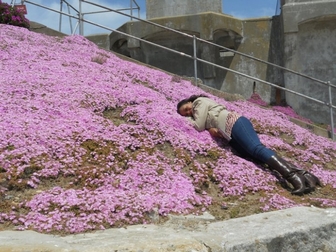THE POEM FROM THE END OF THE EARTH
KWOYA FAGIN MAPLES
The poem I find at the end of the earth looks like death on a motorcycle.
It’s got bad breath and no style, and it needs a ride.
I’m driving my best car, my ’98 convertible white Mustang
and there is room—since I’ve come alone--
I mean, who wants to ride just to be riding,
when you gotta pass through the end of the earth?
Against my betters,
I flip the lock up on the passenger door.
As the poem gets settled,
a cloud of dusty funk fills my nostrils,
but I’m hearing things I’ve learned in church lately,
and decide to be a good neighbor.
I consider the idea that the poem is human too,
so I look the poem square in the mouth and ask where it’s from.
“Here.” The poem says,
picking the bigger pieces of lint out of its hair.
I begin to wonder if the poem is telling the truth about all this.
When it said “here,” it kind of sounded like “hair,”
and that couldn’t be the accent at the end of the earth.
Bored beside me,
the poem begins cleaning out its pockets.
There are keys,
a wrist watch with a smashed face,
matches,
a black pocket comb,
licorice,
and a pistol.
The poem sets the gun on its lap
sideways like a gangster, pointed straight in my direction,
its middle finger against the trigger.
I act like I don’t notice.
In my periphery I see the poem considering me in a patient—
yet irritated— kind of way.
My belly folds up like a rolly-polly,
But I keep on the gas.
I figure,
The farther we get away from the end of the earth,
the better.
Like every murder victim I’ve seen on T.V.,
like I have a chance,
like I have something else to offer other than
everything, I stupidly ask the poem what it wants.
“A tall drink of water,” it laughs,
smirking and picking at something caught in its teeth.
It’s got bad breath and no style, and it needs a ride.
I’m driving my best car, my ’98 convertible white Mustang
and there is room—since I’ve come alone--
I mean, who wants to ride just to be riding,
when you gotta pass through the end of the earth?
Against my betters,
I flip the lock up on the passenger door.
As the poem gets settled,
a cloud of dusty funk fills my nostrils,
but I’m hearing things I’ve learned in church lately,
and decide to be a good neighbor.
I consider the idea that the poem is human too,
so I look the poem square in the mouth and ask where it’s from.
“Here.” The poem says,
picking the bigger pieces of lint out of its hair.
I begin to wonder if the poem is telling the truth about all this.
When it said “here,” it kind of sounded like “hair,”
and that couldn’t be the accent at the end of the earth.
Bored beside me,
the poem begins cleaning out its pockets.
There are keys,
a wrist watch with a smashed face,
matches,
a black pocket comb,
licorice,
and a pistol.
The poem sets the gun on its lap
sideways like a gangster, pointed straight in my direction,
its middle finger against the trigger.
I act like I don’t notice.
In my periphery I see the poem considering me in a patient—
yet irritated— kind of way.
My belly folds up like a rolly-polly,
But I keep on the gas.
I figure,
The farther we get away from the end of the earth,
the better.
Like every murder victim I’ve seen on T.V.,
like I have a chance,
like I have something else to offer other than
everything, I stupidly ask the poem what it wants.
“A tall drink of water,” it laughs,
smirking and picking at something caught in its teeth.
MARY-ELLA IS A DE-FEATHERED CHICKEN
KWOYA FAGIN MAPLES
She’s the cool squish-bird in plastic
wrap. Today she wears her own hair,
a mush brown
helmet wig. But there is something pure
about her, something as demure-soft
as her shoes. I imagine
her feet wrapped in that leather, tender buffed sheep--
bare feet--
how the heel and ball roll, lay, get
up again—leisurely, as if they were made
for a chaise,
I imagine her feet so soft in my hands,
I could bone squeeze them crushed.
wrap. Today she wears her own hair,
a mush brown
helmet wig. But there is something pure
about her, something as demure-soft
as her shoes. I imagine
her feet wrapped in that leather, tender buffed sheep--
bare feet--
how the heel and ball roll, lay, get
up again—leisurely, as if they were made
for a chaise,
I imagine her feet so soft in my hands,
I could bone squeeze them crushed.
KWOYA FAGIN MAPLES is a writer from Charleston, S.C. She holds an MFA in Creative Writing from the University of Alabama and is a graduate Cave Canem Fellow. In addition to a chapbook publication by Finishing Line Press entitled Something of Yours (2010), her work is published in several journals and anthologies including The African-American Review, PLUCK, Cave Canem Anthology XIII, The Birmingham Poetry Review, Right Hand Pointing and Sow’s Ear Poetry Review. Her current manuscript, MEND, tells the story of women who were the experimental subjects of Dr. James Marion Sims of Montgomery, Alabama. This work received a grant from the Rockefeller Brothers Foundation.
Maples teaches Creative Writing at the Alabama School of Fine Arts and organizes a three-dimensional poetry exhibit which features poetry and visual art including original paintings, photography, installations and film.
Maples teaches Creative Writing at the Alabama School of Fine Arts and organizes a three-dimensional poetry exhibit which features poetry and visual art including original paintings, photography, installations and film.


